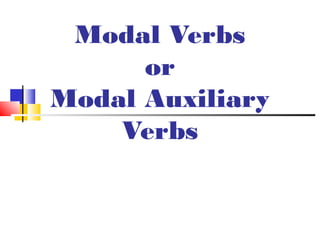
Modal Verbs for the test
- 1. Modal Verbs or Modal Auxiliary Verbs
- 2. Modal Verbs We have lots of “modal verbs”, such as: Can Shall Could Should May Ought to Might Must Will Need Would Dare
- 3. USE of Modal Verbs We use modal verbs to talk about possibility, willingness, ability, obligation, certainty and permission. Examples: It might rain. (possibility) Will you help me?(willingness) Can she swim? (ability) You must be home by 11 o’clock. (obligation) You haven’t eaten all day. You must be hungry. (centainty) May I borrow your car? (permission)
- 4. FORM of Modal Verbs We form the affirmative by putting the modal verb between the subject and the full verb. “We should go” Subject (or pronoun) + Modal verb + Verb Modal verbs take the same form in all pronouns. The verb doesn’t change after modal verb. “We should goes” “We should going” “We should went” “We should to go”
- 5. FORM of Modal Verbs NEGATIVE FORM: We form the negative by putting “not” after the modal verb. “She can’t swim” “It might not rain” INTERROGATIVE FORM: We form questions by inverting the subject and the modal verb. She can swim. Can she swim? We should go. Should we go?
- 6. Ability CAN COULD BE ABLE TO Expresses Expresses Expresses general general ability in general ability in ability in the past the present. the past. and in the present. It means “Puedo” It means “Pude” It means “Tengo o tuve la habilidad de…” “I was / am “I can play the “I could play guitar” the guitar” able to play the
- 7. Permission CAN COULD MAY MIGHT Is the most Is less direct More formal Less direct common. and polite than than can or and formal can could It gives General It gives permission permission to permission do something in the past
- 8. Obligation and Necessity MUST HAVE TO We use must when the We use have to when the authority comes from the autthority comes from speaker. outside the speaker. It is used in the present and Used in the past (Had to) in the future QUESTIONS: Use of “You must be home by 10 do/does in present simple o’clock” and did in the past. “I have to be home by 10”
- 9. Obligation and Necessity DON’T DON’T MUSTN’T HAVE TO NEED TO NEEDN’T Obligation Is not It is not It is not not to do necessary to necessary to necessary to something do do do something something something You musn’t I don’t I don’t I needn’t smoke in a have to get need to get get up today. hospital up today. up. I’m on holiday.
- 10. Obligation and Advice SHOULD OUGHT HAD SHALL TO BETTER Obligation and Obligation Expresses a We use it duty and duty strong when we Ask for and give (laws or recommendation want to know advice rules) in a particular someone’s situation. opinion, or Say what is right Ask for and give advice Present or when we or wrong Say what is future, not past. want advice right or wrong or
- 11. Possibility MAY MIGHT COULD Used in present Used in present Used in present or or future or future future +++May ++Might +Could It doesn’t express posibility in negative “There is “We might go to “Where is Simon?” someone at the the beach” “He could be in door, it may be the living room”
- 12. Probability SHOULD OUGHT TO It is used to say that It is used to say that something is probable at something is probable at the moment of speaking, or the moment of speaking, or in the future. in the future. “Sally should be at work “He ought to pass his by now.” driving test easily.”
- 13. Request CAN COULD MAY WILL WOULD It is used to It is used to It is used to We use it to We use it to ask for ask for ask for ask someone ask someone something something something to do to do Less Direct The most something for something for and more formal us. us, but is polite more polite. It is used to It is used to It is used to Would like: ask for ask for ask for Polite way of permission permission permission saying what and to ask and to ask we want. someone to someone to “I would like do something do something a glass of for us. for us, but is water, please”
- 14. Offers Will Shall Can Could Would It is used to Shall I? is It is used to It is used to It is used with say that we used to offer offer to do offer to do like, prefer are willing to to do something for something for and rather, to do something something for someone. someone. make polite or to offer to someone. Is more polite offers and do something. and less invitations. direct. I will help you Shall I help I can send I could lend Would you with your you? this letter for you money if like to go to a suitcase. you. you want. party on Saturday?